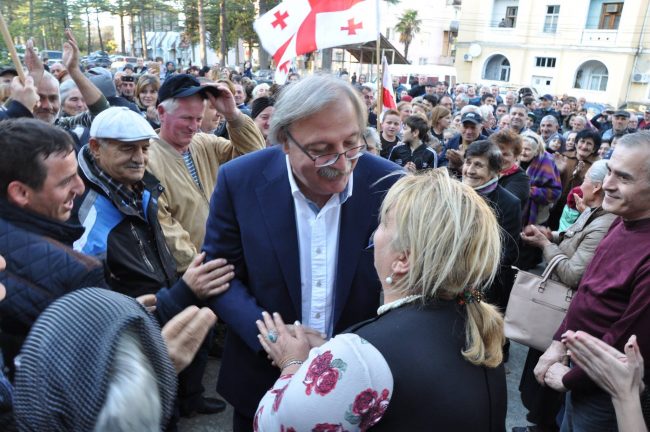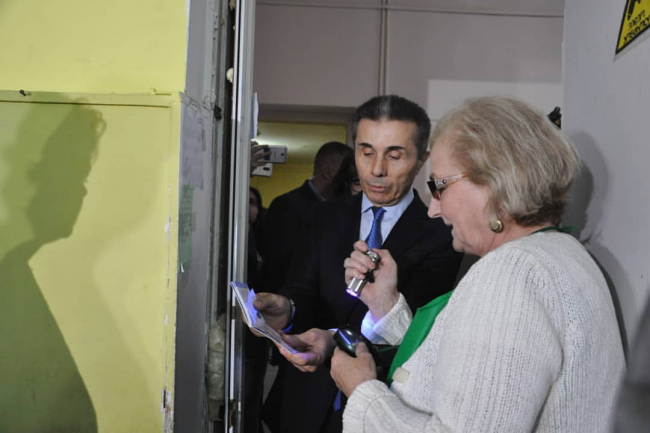Georgia’s Vashadze promises ‘snap parliamentary election’ if elected president


The opposition candidate in Georgia’s second round presidential election, the United National Movement’s (UNM) Grigol Vashadze, has promised snap parliamentary elections if elected. Meanwhile, chair of the ruling Georgian Dream party Bidzina Ivanishvili promised ‘remarkable’ changes ‘within a year’.
Speaking to supporters in Kutaisi on 4 November, Vashadze said snap elections leading to a coalition government were his main priority if elected.
‘With few exceptions, none of those sitting in parliament and in government today deserve to be there; they don’t have the moral or political right to be there at the expense of the people’, Vashadze stated.
Vashadze was narrowly defeated in the first round on 28 October by Georgian Dream backed candidate Salome Zurabishvili, with 38% of votes to 39%.
The second round, the first in Georgia’s history, is due to be held on or before 2 December.
A number of political leaders, including presidential candidates Shalva Natelashvili, leader of the Labour Party, and Davit Usupashvili, former parliamentary speaker, have also demanded snap elections.
Vakhushti Menabde, an expert in constitutional law at Ilia State University, told OC Media that snap parliamentary elections would be held only if the government fell and parliament failed to elect a new one.
This includes if the prime minister resigns ‘for any reason’ or if the government fails a vote of confidence in parliament.
‘If there is not a majority of 76 votes [in parliament] needed to confirm a new prime minister and cabinet, it triggers the need for snap elections.’
Georgian Dream currently hold 114 of 150 seats in parliament.
During his election campaign in early September, Vashadze also promised to pardon former Georgian President Mikheil Saakashvili, as well as other ‘political prisoners’ convicted and jailed in Georgia, including ex–Interior Minister Vano Merabishvili and ex–Corrections Minister Bacho Akhalaia.
[Read about the former officials convicted after 2012 on OC Media: Georgian Dream MPs warn of ‘civil war’ if Vashadze elected]
All three have insisted they would not seek a pardon.
In a pre-recorded video address aired on 5 November on TV channel Imedi, Georgian Dream party chair Bidzina Ivanishvili said the opposition had ‘openly announced they would let people convicted of torture out of prisons; this not only offends the public but creates direct potential of destabilisation’.
Promises ‘beyond presidential powers’
Vashadze also promised, among other things, to raise the minimum wage for teachers to ₾1,000 ($370). He also vowed to amend the constitution to restrict the cultivation of drugs in Georgia, but also to announce amnesty for those prosecuted for possessing or consuming ‘soft drugs’.
In the first round, Davit Bakradze, European Georgia’s presidential candidate, promised to raise pensions by ₾50 ($18) a month and to cut income tax — a promise similar to what also Vashadze made.
Zurabishvili also made big promises, including the ‘withdrawal of Russian troops from the occupied territories of Georgia’, and a ‘full investigation’ into the death of Georgia’s first president Zviad Gamsakhurdia.
Zurabishvili has not so far renewed her campaign for the run-off since failing to win outright in the first round.
In his televised address on Monday, Ivanishvili insisted campaign promises made by Zurabishvili’s rivals were based on lies. ‘They shamelessly make promises to people that in the parliamentary system are entirely beyond presidential powers’, Ivanishvili said.
‘Worries and frustration’
In his address to ‘frustrated’ supporters heading to polls for the second round, Ivanishvili urged Georgians ‘not to punish’ the country even if they were angry at public officials and were ‘eager to punish the ruling party’.
[Read about the results of first round on OC Media: Georgian presidential election to go to second round]
‘I want you to know that I hear you well, I understand your worries and frustration, I understand that you’re not happy as your lives haven’t improved significantly. I understand your discontent as you think some public officials care more about their own well-being than of the people’s; you’re not happy as the party in power has failed to restore justice’.
He warned Georgians they were facing ‘an ordeal’ as the government had ‘made the comeback of a repressive regime possible’.
He vowed to ‘go against’ his own party if ‘it doesn’t work’ in future.
‘Nevertheless, we cannot let the power willing to destroy all the values so dear to us to use these mistakes’, Ivanishvili warned. He urged Georgians to be aware of the ‘risk of making the wrong choice’ in favor of a ‘rival which is not a political party but violent people united for political retribution’.
‘One more year’
In his video address, the Chair of Georgian Dream promised he would take full responsibility for ‘correcting the flaws’ of his party rule ‘within a year’.
Ivanishvili promised ‘drastic changes, foremost, for the most socially vulnerable’. He said aid for pensioners and internally displaced people needed ‘radical revision’.

He promised to deliver ‘remarkable’ changes ‘within a year’ in an earlier TV appearance on 23 October, where he also vigorously denied accusations of involvement in a state racket against businesses, accusing media of spreading false information.
In his 5 November pre-recorded speech, the former Prime Minister characterised the period since Georgian Dream came to power as unprecedented years of ‘stable development’, marked by ‘business freed from racketeering’ and an independent media, but marred by ‘Georgia’s biggest challenge’ — poverty.
In September, Georgian conglomerate Omega Group, which also owns TV station Iberia TV, accused Ivanishvili of political pressure, after allegedly refusing to provide money and cars for senior government officials.
[Understand Georgia’s tapes scandals on OC Media: Georgia’s tapes scandals suggest something is rotten at the top of Georgian politics]
In mid-October, Iberia TV stopped all news and political programming blaming financial pressure from the authorities.
On 27 October, a day before the presidential elections, the Revenue Service announced the seizure of Omega Group assets would be lifted as they had paid ₾1 million ($370,000) in owed taxes, and requested a tax debt restructuring plan.
A return of the ‘the old guard of Georgian Dream’
On Monday, as he warned the public of the possibility of the UNM’s return to power, Ivanishvili called on the ‘old guard of Georgian Dream’, those who ‘made the impossible possible in 2012’, to join him again.
‘Georgia is in need of your loyalty and experience, your civic heroism again […] I promise that all patriots will find their place in our common family. No one’s contribution will go unacknowledged’, Ivanishvili promised.
He did not specify who the ‘old guard’ were.
Ghia Khukhashvili, a former advisor to Ivanishvili during his early premiership, criticised him for his lack of ‘leadership skills’, and for not ‘facing and recognising problems’ before the 28 October elections.
Khukhashvili, an independent expert that has been critical of the government, said he would not join Ivanishvili’s team as he said he didn’t see ‘guarantees’ that ‘real actions’ would follow Ivanishvili’s words.
Speaking with journalists on 26 October in a second interview during the presidential pre-election period, Ivanishvili characterised the party he founded and chaired as ‘practically inactive’, but pledged to renew its management with ‘strong people’.
Ivanishvili, who retired from politics in late 2013, promised to put his house in order upon his formal return to politics in early May, which came amidst reports of intra-party tensions.
Following the reports of tensions, the party’s founder replaced then-Prime Minister Giorgi Kvirikashvili as Georgian Dream’s chair on 11 May.
A month later, Kvirikashvili resigned as prime minister and from the party, citing disagreements over economic policy with the ‘party leadership’, and departed from the political scene altogether.
In a 24 July interview with the Georgian Public Broadcaster, Ivanishvili openly accused Kvirikashvili of lobbying for Georgian banks and failing to address poverty during his tenure in office.
The reshuffled cabinet under new Prime Minister Mamuka Bakhtadze promised in summer a ‘small government’ that would free up ₾100 million–₾120 million ($41 million–$49 million) for social programmes, and a crackdown on predatory lending.
However, opposition parties like the UNM and European Georgia have criticised the new government’s attempts to reform and regulate the Georgian banking system as damaging for the economy.
Several non-governmental organisations and the Public Defender of Georgia have also pointed to Georgian Dream’s ‘failure’ to address allegations of corruption in law enforcement agencies.









